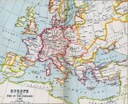Research Projects
Within the scope of its activity, and with the aim of increasing the knowledge in areas insufficiently studied in the area of Social Sciences, CEPESE has been developing several research projects, many of them with an international scope. Among the financing entities, in addition to the FCT – either through direct financing or through multi-annual financing – other institutions are also relevant, both public and private, such as the European Science Foundation, Municipalities, the Assembly of the Republic, Ministries, Foundations and Entreprises.
Archival Treatment of the Document Collection of the Santa Casa da Misericórdia do Porto
Recognizing the importance of the document collection of the Santa Casa da Misericórdia do Porto (SCMP), CEPESE undertook the treatment and inventorying of the archival fonds accumulated over many decades in institutions under the administration of the SCMP.
Processes of Acquisition, Alteration, or Termination of Legal Personality of Associations
This archival and documentary project, completed in 2018, focused on the detailed description of the "Processes of acquisition, alteration, or termination of legal personality of associations," a documentary series from the former Civil Governments, now under the custody of the General Secretariat of the Ministry of Internal Affairs.
Bragança. From its Origins to the Liberal Revolution of 1820
Following the project "Bragança in the Contemporary Age (1820-2012)", developed by CEPESE and resulting in a two-volume publication released in 2013, this research project aimed to continue the study and publication of the history of Bragança, extending from its prehistoric origins to 1820. The focus was on providing a rigorous and critical account of the city's evolution within the national and Iberian context.
The Civil Governors of Bragança (1835-2011)
This project aimed to review, complete, and significantly expand the biographies of the Civil Governors of the Bragança District from its establishment in 1835 to its abolition in 2011. The objective was to understand their actions leading the District as representatives of the Lisbon Government and to trace the evolution of their functions in accordance with the regulatory framework in force at each moment. The study also explored the evolution of districts in Portugal in general, with a specific focus on the Bragança district.
YOU2_TELL_EU
This project aimed to preserve and transmit the memories of immigrants from Eastern Europe, based on accounts of their experiences leading up to the fall of the Berlin Wall. The project was supported by storytelling labs and screening sessions of the produced videos. CEPESE was the institution responsible for disseminating the project in Portugal and took part in organizing the European Storytelling Laboratory and the European Event on Oral History and Storytelling "You2TellEU," in collaboration with the Associazione Nazionale Comuni Italiani Toscana (Italy) and the St Vincent's Family Project (United Kingdom).
DIGIGOV - Digital Official Journal
This research project involved the digitization, image-to-text conversion, and online availability of all editions of the official journal of the Portuguese State published between the Constitutional Revolution of 1820 and the end of the Constitutional Monarchy. It also included a historical-documentary analysis of this source, along with comparative studies with some of the major foreign official journals. Completed in 2019, this project provided an invaluable source for the history of Contemporary Portugal, given the diversity of topics it covers, its continuity over time, and the extent of its content. Fully achieving its proposed objectives, the platform became available online in August 2019, with editions accessible in various formats and the various studies produced within the scope of this project.
Bragança. From its origins to the Liberal Revolution of 1820
Following the project Bragança in the Contemporary Age (1820-2012), developed by CEPESE and resulting in a two-volume work published in 2013, this research project aimed to continue the study and publication of the history of Bragança, now from its prehistoric origins to 1820, in a rigorous and critical manner, seeking to capture the city's evolution in the national and Iberian context. The project set out to analyze the administrative evolution and the demographic, economic, social, and cultural structures of the city, as well as the political reality, heritage, and transformations of the urban space.
Routes of Memory
The objective of this project was to create tourist routes in the North of Portugal based on the flows of Portuguese emigration to Brazil from 1822 to 1949.
Portuguese Political and Business Elites
This research project aims to complete a digital database identifying Portuguese political and economic elites at both central and local levels, from the early days of Constitutionalism (1820) to the present.
History of accountancy professionals in Portugal
Historically, the functions currently performed by certified accountants, from the second half of the 18th century onwards, were carried out by bookkeepers, who saw their profession recognized through specific legislation.
ITRACOTUR - Knowledge Transfer Initiative for Tourism Online Promotion
ITRACOTUR – KNOWLEDGE TRANSFER INITIATIVE IN ONLINE TOURISM PROMOTION This project, concluded in 2018, aimed to gather information and explore business strategies for the regional tourism sector, with a particular focus on the opportunities created by social media and user perspectives. The intervention space for this initiative was the Northern Region of Portugal. The results were primarily practical, including the transfer of knowledge and the mapping of a guide to regional tourism best practices, the development of Business Intelligence Strategies on how to use 2.0 and 3.0 communication in choosing tourist destinations, and the utilization of the cultural, historical, heritage, and natural characteristics of the Northern region of Portugal for tourism promotion.
History of Accounting in Portugal
The history of Accounting in Portugal, regardless of the validity and usefulness of the studies published so far, was yet to be done.
Cohesion Building of Multi-ethnic Societies, 10th-21st Century
Funded by the Ministry of Science and Higher Education of Poland through the National Program for the Development of Humanities, and executed by the University of Wroclaw (Principal Investigator - Prof. Przemek Wiszewski), this project involved the participation of six researchers from CEPESE. Its objective was to analyze processes of social cohesion in multiethnic societies from the 10th to the 21st century.
Prime Ministers of Portugal (1820-2020)
Focusing on the Prime Ministers of Portugal since the beginnings of the parliamentary regime institutionalized with the Liberal Revolution of 1820, this project aimed to present their biographies and the activities they undertook during their mandates. It also included a study on the creation of the position, competencies, and responsibilities in different historical periods, as well as their socio-professional characterization. Considering the time elapsed since the initially planned completion date of the project (2017), the study period was extended to include the incumbent Prime Minister at that time.
Avaliação e Intervenção em Famílias em Risco
Iniciado em 2015, este Projeto de Investigação, coordenado por Joana Sequeira, teve como principais objetivos o estudo do funcionamento familiar em diversas circunstâncias.
Personal Social Networks of Portuguese Elderly
Under the coordination of Sónia Guadalupe, this research project aimed to describe and classify (create typologies) the personal social networks of Portuguese elderly individuals regarding their structural, functional, and satisfaction characteristics.
SIHER - Processes of Sedimentary Infilling and Holocene Evolution of the Ria Formosa Lagoon System
This Project, developed by the University of Algarve with the participation of CEPESE, aims at analysing the physical and geological processes in the Ria Formosa lagoon system resulting from natural climate changes during the transition of the last glacier to interglacial, to which are added effects of anthropic activity.
AZULEJAR – Conservation of Tiles on Façades
This Project aims at characterizing façade elements in several buildings in need of conservation actions involving their historical context, taking into consideration the production methods, their composition and the factors for the degradation of tiles.
LANDYN – Changes of Land Use and Occupation in Mainland Portugal: Characterization, driving Forces and Future Scenarios
This project aims at providing an accurate image of the changes regarding land use and occupation - to identify and understand the main forces driving these changes and to build the main scenarios for those changes until 2040.
Ageing and Health in Portugal. Policies and practices
The project Ageing and Health in Portugal. Policies and Practices aims at measuring the relationships between the health status of the Portuguese population and the expected increase of education levels over the next decades, assessing the range and implications of this co-relationship, through the combination of demographic and econometric analysis techniques that allow a systemic view of this phenomenon, in order to support the decision making process within the scope of the health public policies.




















